From Orkney to Amity Island: Jaws star Robert Shaw's Stromness childhood
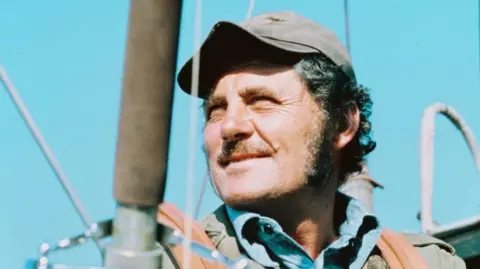 Getty Images
Getty ImagesFor film fans across the world, the English actor Robert Shaw will always be Quint.
The hard-bitten, shark-hunting, salty sea dog from Steven Spielberg's 1975 summer blockbuster Jaws was a defining role for the distinguished stage and screen star, the more so since it came just three years before his sudden death at the age of 51.
June has seen a surge of events and media coverage marking the 50th anniversary of the film, now firmly established as a much-loved and lauded classic.
What's less well-known is that Shaw's path to stardom and success included five years as a child in Orkney, a period which would have a huge effect on the rest of his life.
Speaking on a US chat show more than more than 30 years after leaving Orkney, Shaw spoke movingly of the influence the islands had on him and his family.
"My father killed himself when I was 12," he said.
"He was an extraordinary man, a marvellous man and he was a doctor in the Orkney Islands, which is right at the top of Scotland. Those terrible islands where there's wind and sea and you get a hundred-mile-an-hour gales.
"He was the lighthouse doctor and he used to keep a medical bag on each island and when you couldn't get in because the sea was so rough, my father would go out... and jump off and swim ashore.
"And there would be his medical bag and then he'd deliver whatever baby was to be delivered."
That story perfectly summed up the mixture of romance, nostalgia and pain which Shaw carried with him from his Orkney childhood.
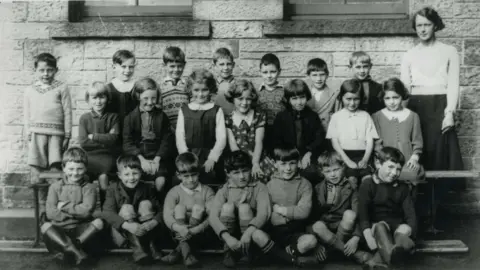 Orkney Library and Archive
Orkney Library and ArchiveRobert Shaw was born in Lancashire in 1927 and lived there until the age of seven, when his father Thomas took over a GP practice in Stromness, Orkney's second-largest town.
The new doctor and his wife moved there with their five children. The couple were Cornish, though both had Scottish ancestry. They may have felt a connection with their new home at the other end of the British Isles, but they undoubtedly stood apart from their new neighbours.
Christopher Shaw Myers is Robert Shaw's nephew. His mother, Joanna, was the actor's younger sister. His new book - Robert Shaw: An Actor's Life on the Set of Jaws and Beyond - explores the period in Stromness.
He's struck by a class photograph which shows a young Robert Shaw standing by himself on the back row, distinctly separated from his classmates.
"Isn't it unusual? Or interesting, I should say. How Robert is standing apart and rigidly at attention and very much looks the outsider," he says.
"By that point he was six or seven years old, he had an English accent and accents are really important, especially with children. They define if you're part of a group or an outsider. The Shaws were outsiders."
Speaking on BBC Radio Orkney in 2018, Christopher's mother Joanne offered some insight into what isolated her family from others.
"I just remember what a unit we were, because for various reasons mother wouldn't have other children over after school," she said.
Among the "various reasons" other children weren't allowed to play at the Shaw house was the doctor's increasingly out of control alcoholism.
After around six years in Stromness their mother left him and took the children south, to England. Eventually he followed and the family was briefly reunited. But after years of struggling with his addiction, Thomas took his own life.
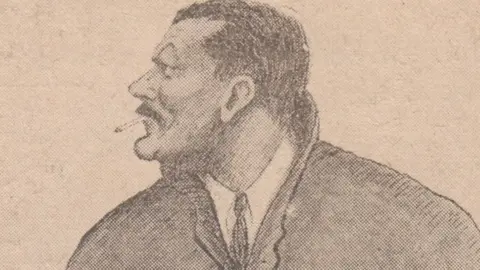 Orkney Library and Archive/Orkney Herald
Orkney Library and Archive/Orkney HeraldRobert would go on to enjoy some success as a novelist as well as an actor, and Christopher believes much of his Orkney childhood can be found in his two published works The Hiding Place, and The Sun Doctor.
The former includes descriptions of landscapes clearly inspired by the shipwrecks in Scapa Flow. And there are emotional resonances too.
"He was pulling from his Orkney experiences as a child for much of what's in The Hiding Place. And then in The Sun Doctor, I think he went a step further than that.
"The father is an alcoholic who didn't kill himself but died and the mother was blamed," he says.
"And that was something that my grandmother always had to deal with. That some people blamed her for the death of her husband. Whether she had killed him directly or drove him to drink."
After a short spell as a teacher, Robert trained as an actor and spent much of the 1950s building up his career on stage and screen.
He was the star of the popular TV drama The Buccaneers but his film breakthrough came in 1963 as a villainous heavy with the rather Scottish name of Donald Grant in the second Bond film From Russia With Love.
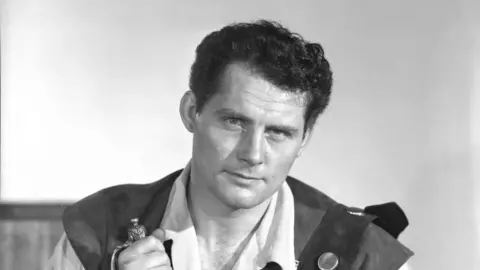 Getty Images
Getty Images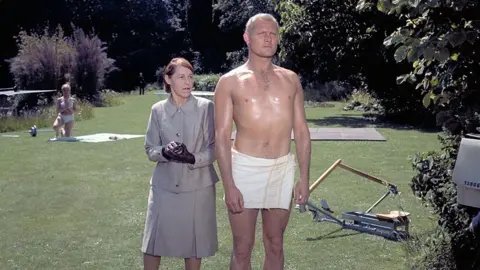 Getty Images
Getty ImagesThat same year he returned to his former home in Stromness. He was on honeymoon with his second wife, the actress Mary Ure.
They stayed at the Stromness Hotel and while there were talked into helping out with a fundraising event to raise the cash for a swimming pool for the town.
A photograph taken at the event shows the couple posing with the band and the winner of the 'Miss Swimming Pool Stromness' beauty contest, Irene Irvine.
Now Irene Linklater, she fondly remembers that night, 62 years on.
"That was a big surprise. I never really got over it," she says.
"[I] Knew who they were but I had never seen them before and I hadn't still seen a film that they were in but I knew of them."
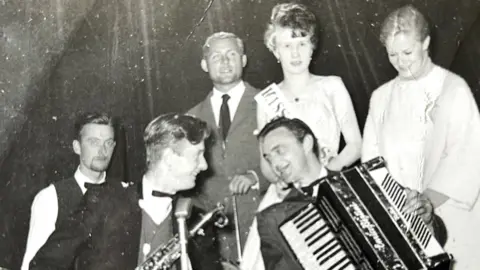 Doris Stout
Doris Stout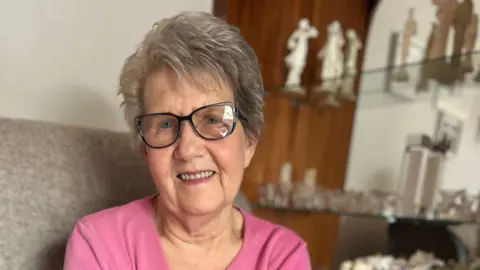
A week after Shaw's death in 1978, BBC Radio Orkney broadcast a tribute. It was presented by Archie Bevan, a local teacher and author who was one of the founders of the islands' St Magnus Festival.
Mr Bevan, who died in 2015, described that 1963 visit and spoke warmly of Shaw's 1963 visit.
"I remember that my first meeting with Robert Shaw that year was on the Stromness golf course. He was playing in a foursome with some members of the local club.
"His dark hair had been bleached to a startling, Aryan blonde, a memento of his starring role as a villain in From Russia With Love, which he'd just finished shooting".
Local artist and author Bryce Wilson has written a history of Stromness.
"He loved to go playing golf with some of his pals who were still around. I remember him coming with Mary Ure. That was the talk of the town," he says.
Shaw's career brought him great acclaim and riches, with an Oscar nomination for his portrayal of Henry VIII in A Man For All Seasons and starring roles in enduring classics such as Battle of The Bulge, The Taking of Pelham One Two Three and The Sting.
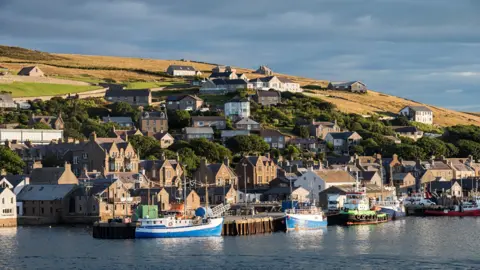 Getty Images
Getty ImagesBut he was a troubled man. Like his father, he struggled with alcohol. It impacted upon his work and home life. He was married three times and had 10 children.
After years of mental health and addiction issues, Mary Ure died of an accidental overdose of alcohol and prescription medicine in 1975, just two months before the release of Jaws.
And three years later Shaw, by then remarried and living by a lake in rural Ireland, died suddenly of a heart attack. He was 51.
Jaws is probably the film he is most remembered for. It changed the way Hollywood released summer movies, creating the modern blockbuster. It confirmed 28-year-old Steven Spielberg as the biggest director of his generation and is today regarded as one of the greatest American films.
Shaw's Quint steals the film and screenwriter Carl Gottlieb credits the actor with writing the character's chilling monologue about the sinking of the USS Indianapolis in World War Two.
The film's 50th anniversary has brought festivals, films showings and tributes across the world.
Back in Orkney, many are remembering Robert Shaw as one of their own.
For Bryce Wilson, it all comes back to that childhood in Stromness and the sea.
"Robert Shaw served his apprenticeship for Jaws by mucking about in a boat in the harbour. All the young folk were in dinghies mucking about," he says.
"So that's what we put it down to. It's where he learned to work his passage in Jaws".
You can hear more on Robert Shaw's childhood in Orkney on The Sunday Show on BBC Radio Scotland from 10:00 on Sunday 22 June.
